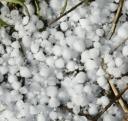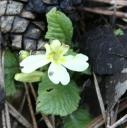I usually only post highlights of our nature walks. Here is a typical example of the whole thing.
The orientation of the slope and the seasons
On a warm, sunny afternoon, there is still hail from last night on the ground near our house.
Not much further on, we turn to a south-facing slope, where we find very early signs of spring. The difference between winter and spring is 100 metres – the length of our driveway as we measured it !
Last year’s dead flower heads still dominate the landscape.
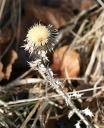
Our neighbour is away today. Her son has been to prune the trees, another sign of spring.
Some history and social studies

It isn’t so easy to recognise this as a rotting cart wheel, but elsewhere in the village they are used as decorations. We pass the boys’ den in a ruined barn.
Further on, we clamber down a slope to collect some litter that will return home with us to be recycled. Futher on, we decipher the signs at the entrance to the farmer’s field. We talk about why he wants us to stay near the edge, and what the electric fence is for. But is it on right now?
We pick out the trail signs for the village footrace at all the intersections. The number of kilometres left to go is also marked out, so we know it is one kilometre to favourite stream.
but our own ruin is right down by the stream where we clamber about the walls of an old mill and over the millstone.
The hazlenut tree
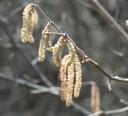
The male flowers are very obvious right now, and if you shake them, their pollen flies off in great drifts. Usually, this is the wind’s job.
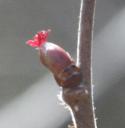
The female flowers are much harder to see.
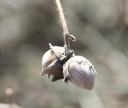
And it’s rather unusual to find a ‘baby’ left over from last year.
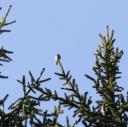
Hard to spot, but at least we recognise the alarm call of the great tit tribes who have spotted us.
Time for an experiment
There’s usually something going on during a walk: a game, a measurement, a drawing or sculpture, a construction or a sport. Today, it’s an experiment.
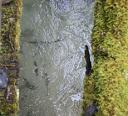
Sticks float, don’t they? Except that we were surprised to discover that about half of them didn’t. You can see them lying there on the bottom of the stream.
Mosses and lichens
This is a great time of year for observing mosses and lichens.

They lay siege to thin stalks and whole tree trunks in the same way, rising like green pyramids.
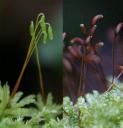
We can tell there are many different kinds, but moss identification is tough. It may start here, with the different spore capsules.
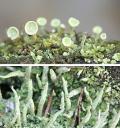
The lichens are also in full reproductive glory.
An exploration and mystery or two
It’s easy to move into new areas with the undergrowth gone.
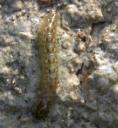
In a quiet, sunny part of the stream under a fossil-filled rock, we discovered a creature.
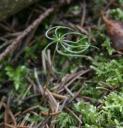
And this tiny windmill? Maybe it’s a baby conifer?
The sunset
It’s a long way home, but a sunset over the whole valley is waiting for us at the end.
